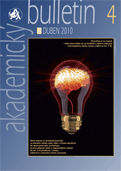Unveiling the mechanism of plant nutrition with nitrogen

2 Mar 2015
Ing. Klára Hoyerová, Ph.D., RNDr. Martin Kubeš, Ph.D., and doc. RNDr. Eva Zažímalová, CSc., from the Institute of Experimental Botany of The CAS took part in the newly published article of the prestigious journal Nature Plants. Their research focused on nitrogen – that is the essential building block of plant nutrition and when there is a lack of it, not only chlorophyll production slows but also the growth of the stem and leaves. Nitrogen arrives at the cells of the root from the soil solution in the form of nitrate, namely through the transceptor NRT1.1/NPF6.3. “This protein is incorporated into the plasma membrane and, in addition to the ability to transport nitrate, it independently sends signals to detect the presence of nitrate. Already this dual function itself is unique in and of itself, but the possibility of NRT1.1/NPF6.3 does not end there. In addition to transporting nitrate, it can transfer the important plant hormone auxin across the plasma membrane,” explains Ing. Klára Hoyerová, Ph.D.
The results of the research by scientists from The CAS published in the prestigious journal Nature Communications

12 Feb 2015
What causes disruptions of chromosome division in mammalian eggs?
The team of Dr. Michal Kubelka, Dr. Andrej Šušor and Dr. Martin Anger from the Institute of Animal Physiology and Genetics of The CAS and their foreign colleagues have made a fundamental discovery of the cause of aneuploidy in eggs that affects as many as 35 % of women over age 35. The missing or additional chromosomes in the egg can inter alia lead to the emergence of Down’s syndrome. The scientific team discovered that the suppression of the function of the molecular pathway mTOR, which is responsible for the synthesis of specific proteins in the right place at the right time, or its disruption leads to genomic instability, even though the egg is capable of being fertilized by sperm.
Unique ability of tumour cells

28 Jan 2015
A tumour cell, whose mitochondria do not function because of missing mitochondrial DNA, can acquires these functional organelles from another cell, and thus restart cellular respiration and renew its tumour potential. This is a discovery that rewrites textbook science, notes the popularization web portal IFLScience.
An international scientific team under the guidance of prof. Jiří Neužil from the Institute of Biotechnology of the CAS and Griffith University in Australia in cooperation with researchers from the Malaghan Institute in Wellington, New Zealand has discovered that cancer cells deprived of mitochondrial DNA, after being introduced in the receptor (mouse), have the ability to “renew” their mitochondrial DNA by acquiring it from the cells of the host. This leads to the renewal of the mitochondrial function of the mitochondria in cancer cells. The results is that the cells again acquire the ability to create tumours. This fundamental discovery of the function of a cancer cell was published in the prestigious journal Cell Metabolism (see http://www.cell.com/cell-metabolism/abstract/S1550-4131(14)00554-3).
125 YEARS OF THE CZECH ACADEMIES OF SCIENCES (AND ARTS)

23 Jan 2015
On Friday, 23rd January, 125 years had passed since the foundation of the Czech Academy of Emperor Franz Josef I for Sciences, Literature and Art (ČAVU), the predecessor of today’s the Czech Academy of Sciences. This significant jubilee will be commemorated by the Czech Academy of Sciences with several ceremonial events, exhibitions and lectures throughout 2015. The founder and first president of ČAVU was Josef Hlávka, an architect, builder, politician and patron. The Masaryk Academy of Labour and the Czechoslovak Academy of Sciences later built on the activities of this institution.
Breakthrough in laser technologies

13 Jan 2015
The first borane laser in the world has been developed by the Institute of Inorganic Chemistry of the CAS
Scientists from the Institute of Inorganic Chemistry of the CAS under the guidance of Dr. Michael G. S. Londesborough in cooperation with colleagues from the Spanish National Research Council have developed a new type of laser on a purely inorganic basis. A compound of boron and hydrogen from a solution emits a blue light and can become the basis of new modern lasers, which would be more ecologically friendly and more economical. The scientists used a borane for the first time in history to acquire laser light. The research results were published in the prestigious journal Nature Communications.
XLVth Session of the Academy Assembly of the CAS

16 Dec 2014
Discussion of the new strategy of the Czech Academy of Sciences
At the National House of Vinohrady in Prague, the Academy Assembly of the CAS met on Tuesday 16 December 2014. The main theme of the XLVth session was the new Strategy AV21 of the Czech Academy of Sciences, on which the President of the CAS Prof. Jiří Drahoš informed them along with the Report on the Activities of the Academy Council of the CAS for the period since the last assembly. In connection with the new strategy of the CAS, the delegates were also familiarized with the new logo of the Czech Academy of Sciences.
Representatives of the ESF discussed the evaluation of research at the CAS

20 Nov 2014
The issue of the evaluation of research was the main topic of a discussion meeting of the representatives of the Academic Council of the CAS with two directors of the European Science Foundation (ESF) – with Chief Executive of the ESF Martin Hynes, MBA, and with the Head of Evaluation Services Dr. Siobhan Phillips. The meeting took place on Wednesday, 19 November 2014 at the headquarters of the Academy of Sciences in Prague and was attended also by the President of the CAS Prof. Jiří Drahoš.
Ferromagnetic-semiconductor devices

31 Oct 2014
Researchers from the Institute of Physics CAS contributed to a review of a prominent field of modern physics
Over the past two decades, the research of ferromagnetic semiconductors, with (Ga,Mn)As as a prime example, has led to a deeper understanding of relativistic spin-dependent phenomena in magnetic systems. It has also led to discoveries of new effects and demonstrations of unprecedented functionalities in experimental micro-electronic and opto-electronic devices.
New ERC project in the Institute of Physics of the Academy of Sciences

22 Sep 2014
Joerg Wunderlich from the Department of Spintronics and Nanoelectronics of the Institute of Physics CAS, with his colleagues from the UK and Germany, was awarded the prestigious ERC Synergy Grant for the project “Spin-charge conversion and spin caloritronics at hybrid organic-inorganic interfaces”. The project has started in August 2014 and will run till July 2020. Besides the Institute of Physics, the other participating organizations are the University of Cambridge, Hitachi Cambridge Laboratory, Imperial College in London, and the Johannes Gutenberg University in Mainz.
World premiere performance of the original version of Dvořák’s opera Alfred

16 Sep 2014
An extraordinary cultural event was held on 17th September 2014 as part of the music festival Dvořák’s Prague: The world premiere performance of Dvořák’s first opera, Alfred, was performed in the original version with German text. Despite the fact that Antonín Dvořák is one of the most well-known composers worldwide, many of his compositions are rarely performed. In case of this realisation of Alfred, more than dramaturgical decisions were required. Musicians, producers, and also musicologists have taken part in this ambitious project.






